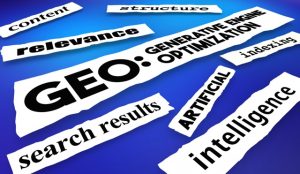As AI technologies evolve, they offer unprecedented opportunities for marketers to enhance engagement, personalize experiences, and streamline operations. However, the integration of AI into digital marketing is not without its complexities and challenges.
In this comprehensive blog, we’ll explore how AI is revolutionizing digital marketing strategies, delving into its applications in SEO, content creation, social media, and more. We’ll also navigate the ethical considerations, privacy concerns, and potential pitfalls of relying heavily on AI.
Join us as we uncover AI’s transformative impact on digital marketing and how businesses can leverage this powerful technology to stay ahead in a competitive market.
Understanding AI in digital marketing
So, what exactly is AI? In simple terms, AI refers to computer systems that perform tasks that typically require human intelligence. These computer systems are designed to analyze vast amounts of data, learn from patterns, and make decisions based on this information. In digital marketing, AI helps marketers automate processes, improve efficiency, and enhance customer experiences.
AI-driven data analysis and decision-making
In today’s digital landscape, data is everything. Every click, swipe, and purchase generates data points that hold invaluable insights. But how can businesses effectively leverage this vast amount of information to improve their marketing strategies and drive success? The answer lies in the revolutionary power of AI in data analysis and decision-making.

Unleashing the power of big data
In the digital age, businesses are inundated with customer data from various sources, such as social media, websites, and online transactions. It is essential to make sense of this volume of data to understand consumer behavior and preferences.
AI-driven data analysis enables businesses to sift through this information, find patterns, and extract actionable insights. This saves marketers countless hours of manual analysis and empowers them to make data-driven decisions precisely.
Machine learning for accurate predictions
AI’s machine learning capabilities take data analysis to a whole new level. By training algorithms on past data, AI is able to accurately predict future outcomes, such as customer preferences, trends, and even potential sales.
This allows marketers to tailor their campaigns, targeting the right audience, at the right time, with the right offer. Through machine learning, companies will stay one step ahead of their competitors and nurture long-lasting customer relationships.
Automating marketing campaigns
AI’s ability to automate mundane, repetitive tasks takes digital marketing to a whole new level. By leveraging AI-powered tools, businesses are able to automate tasks like email marketing, ad targeting, and content creation.
AI analyzes customer data to identify the most effective marketing channels, designs attractive ads, and even generates personalized content. This not only saves marketers time and resources but also ensures consistent and efficient campaign execution.
Real-time analytics and decision-making
In the fast-paced digital world, timely decision-making is crucial. AI-driven data analysis provides marketers with real-time insights into campaign performance, consumer behavior, and market trends.
This enables marketers to adapt their strategies on the fly, tweaking campaigns, optimizing targeting, and maximizing ROI. By making data-driven decisions in real time, businesses will stay agile and competitive and capitalize on emerging opportunities.
Mitigating risks with AI
The ever-present realm of digital marketing is not without its risks, with potential pitfalls like fraud, security breaches, and brand reputation damage. AI plays a pivotal role in mitigating these risks. AI algorithms are able to detect fraudulent activities, protect customer data, and flag potential security breaches.
AI can also monitor brand sentiment across social media platforms, helping businesses proactively address any negative feedback or crisis situations, and safeguard their reputation.
Personalization and customer experience
In today’s fast-paced digital world, companies are constantly seeking innovative ways to connect with their customers and provide a personalized experience. Traditional marketing strategies often fall short of meeting these ever-evolving expectations.
However, thanks to the rapid advancements in AI, the game is changing, and a new era of digital marketing strategies is emerging.
One primary way AI is revolutionizing digital marketing strategies is through predictive analytics. With AI-powered algorithms, marketers are able to leverage customer data to predict future behavior and preferences accurately.
By analyzing past interactions and patterns, AI helps businesses deliver targeted and personalized content to their customers at the right time through the right channel. This level of personalization enhances the customer experience and improves the chances of conversions and customer loyalty.
Another significant aspect of personalization is chatbots. Chatbots are AI-powered virtual assistants that are transforming the way businesses interact with their customers. These virtual assistants offer personalized recommendations, answer customer queries, and provide tailored support.
By harnessing the power of Natural Language Processing (NLP), chatbots understand customer intent and respond in a human-like manner. This creates a seamless and personalized customer experience, leading to higher customer satisfaction and increased brand loyalty.
AI-powered recommendation engines are also revolutionizing how businesses deliver personalized experiences. These engines analyze customer behavior, browsing history, and purchase patterns to provide tailored product recommendations.
By suggesting relevant products or content, businesses increase the chances of cross-selling and upselling, ultimately boosting sales and customer satisfaction. This level of personalization not only saves customers time but also helps them discover products or content that they may not have otherwise come across.

AI’s role in content creation
Automated content generation
AI technologies are capable of creating written content, which is particularly useful for generating data-driven reports, straightforward news stories, and even standard blog posts.
For instance, major news outlets use AI to create simple reports and news summaries based on data and information fed into the system.
Enhancing creativity
AI doesn’t merely automate content creation; it also provides new ways for content creators to think differently about their work. AI-powered tools are able to suggest content themes, headlines, or layouts that might not be immediately obvious to human marketers.
These tools analyze existing data from past successful content to generate suggestions that are likely to perform well, thus aiding the creative process.
Personalization at scale
One of AI’s most significant impacts is its ability to personalize content at scale. For digital marketers, this means being able to deliver highly targeted and relevant content to different segments of their audience without manually crafting each piece. AI algorithms track user behavior, preferences, and engagement to tailor content in real time.
Whether it’s adjusting the messages displayed on a website, personalizing email newsletters, or dynamically creating targeted ads, AI allows us to address each user’s unique interests and needs, enhancing engagement and improving conversion rates.
Content optimization
AI tools are also instrumental in content optimization. By analyzing trends and user engagement patterns, they can predict what content will perform best on which platforms at what time.
AI’s role in SEO and social media marketing
AI is significantly reshaping the strategies used in SEO (Search Engine Optimization) and social media marketing, making these practices more efficient and targeted. Here’s how AI is influencing both fields:
AI in SEO
AI is becoming integral to SEO by enhancing how content is optimized for search engines and how websites are ranked. Here are key areas where AI impacts SEO:
Keyword research and content optimization
AI tools are able to analyze vast amounts of data to identify trending topics and suggest keywords that are likely to perform well based on current search engine algorithms and user behavior. This allows marketers to optimize their content more effectively to meet the latest search trends.
User experience optimization
Google’s algorithms increasingly prioritize user experience signals such as page load times, interactivity, and the stability of content as it loads. AI helps optimize these aspects by analyzing site performance data and recommending improvements, ensuring websites meet SEO standards that benefit both the user experience and search rankings.
Customized search engine results
Search engines use AI algorithms to provide personalized search results based on the user’s past behavior, location, and search preferences. This personalization means SEO strategies must now account for individualized user experiences rather than a one-size-fits-all approach.
Predictive analysis
AI’s predictive capabilities enable marketers to foresee changes in SEO trends and adapt their strategies accordingly. This proactive approach gives businesses a competitive edge by staying ahead of SEO curve shifts.
AI in social media marketing
AI’s role in social media marketing revolves around personalization and automation, enhancing engagement and operational efficiency. Here’s how AI is used in social media contexts:
Automated content creation
AI can generate simple social media posts, suggest updates based on trending topics, or even create basic visual content, helping brands maintain a consistent presence online without constant human input.
Audience insights
AI tools analyze social media data to understand audience preferences and behaviors, such as the times users are most active and the types of content that generate the most engagement. These insights allow marketers to tailor their social media strategies more effectively.
Ad optimization
In social media advertising, AI optimizes ad spend by automatically adjusting bidding strategies and targeting to maximize ROI. AI analyzes the performance of different ad set variations in real time, reallocating resources to the most effective ads.
Influencer marketing
AI helps identify the most suitable influencers for a brand by analyzing factors such as engagement rate, audience demographics, and content style. This ensures that partnerships are likely to be beneficial and resonate with the target audience.
By integrating AI into SEO and social media marketing, businesses can achieve more refined and effective strategies that respond dynamically to both market trends and individual user needs. This not only enhances visibility and engagement but also drives more targeted and cost-effective marketing efforts.

Challenges and considerations
As AI continues to revolutionize digital marketing, it also brings forth a series of challenges and ethical considerations that businesses must navigate carefully. The integration of AI into marketing strategies raises concerns about privacy, dependence on technology, and potential misuse.
Privacy concerns
AI systems require vast amounts of data to learn and make decisions. This data often includes sensitive personal information about individuals, such as their browsing habits, purchase history, and personal preferences.
While we can use this data to enhance user experiences and personalize marketing efforts, it also raises significant privacy concerns.
Businesses must ensure they comply with data protection regulations such as the General Data Protection Regulation (GDPR) in Europe and other local laws. They must handle consumer data transparently, ensuring that information is collected legally and consensually and that consumers are aware of how their data is being used.
Dependence
While AI significantly enhances efficiency and effectiveness in marketing, over-dependence can lead to a lack of human oversight. Marketers must avoid becoming too reliant on AI and ensure that human judgment plays a central role in strategy development and crisis management.
Ethical advertising
AI’s ability to target consumers with unprecedented precision raises ethical questions about the nature of persuasive technologies. There is a fine line between personalized marketing and manipulative tactics that exploit consumer vulnerabilities or subconscious desires. Marketers must navigate this landscape carefully, ensuring that AI is used to enhance consumer experiences and offer value rather than manipulate or exploit.
Transparency and accountability
Finally, transparency and accountability in AI usage are paramount. Businesses should be clear about how they are using AI and the extent to which it influences their marketing strategies.
This transparency builds trust with consumers and helps demystify AI technologies, making them more acceptable to the public. Furthermore, companies should establish clear accountability mechanisms to address any issues or damages caused by AI-driven marketing activities.
Addressing these challenges and ethical considerations is crucial for businesses that wish to integrate AI into their digital marketing strategies responsibly. By prioritizing ethical practices, ensuring transparency, and maintaining a balanced approach to AI implementation, companies can harness the power of AI while respecting consumer rights and promoting a fair marketing environment.
Revolutionize your marketing with Revity Marketing Agency
Are you ready to harness the power of AI in your digital marketing strategies but not sure where to start? Contact Revity Marketing Agency today.
Our team of experts is at the forefront of integrating AI technology to enhance digital marketing efforts, from SEO and content creation to social media strategies and beyond. We can help you navigate the complexities of AI, ensuring that your marketing not only meets the current standards but also sets new benchmarks in innovation and effectiveness.
Don’t miss out on the opportunity to transform your business with AI-driven marketing solutions. Contact Revity Marketing Agency now, and take the first step toward revolutionizing your digital marketing strategies with AI.





